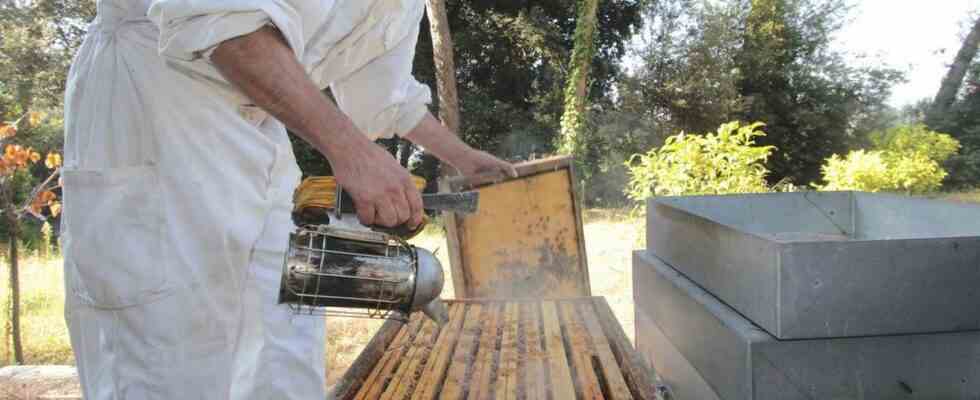The Corsicans sounded the alarm at the beginning of April. Beekeepers fear “to see the disappearance of [leur] activity and [leur] sector” because of two “disastrous” years, above all, linked to climatic conditions, relates Corse-Morning. A finding shared in the Alpes-Maritimes, but also in “the whole of the Great South-East”, indicates Jean-Louis Lautard, president of the union honeys from Provence and the Southern Alps (Sympa) even if it does not go “until there concerning the disappearance of their activity”.
“Throughout the Provencal region, we suffered the same weather conditions,” says the beekeeper based in Tignet. Even if there has been some rainfall, we have not had enough rain since May 2021. ” Since March 31, the Alpes-Maritimes prefecture has even placed several municipalities on “drought alert”, observing a lack of 40% to 60% precipitation, above normal.
“For all the sectors, it is catastrophic, supports Monique Bassoleil, head of the animal sector pole of the Chamber of Agriculture. And for our beekeepers, who have the Label Rouge, who produce one of the most demanded honeys in France and which is very recognized, it is a big loss for their production. »
“For this season, it’s cooked”
In addition to the drought, the department experienced “very low temperatures until a few days ago” with “frosts on April 3”, almost a full year after the frosts of 2021. “We had two nights of continued with – 5 °C, -6 °C. This means that the buds that had come out are cooked for this season. We will have to wait until the following year”, specifies Jean-Louis Lautard.
And there are other dangers for bees, especially “since 2013 and the arrival of Asian hornets that sit in front of hives and prevent bees from getting out”. The president of Sympa continues: “This pressure is increasingly strong, especially on the coast. Since they’ve been there, it’s only grown. And that all summer and now, even fall. »
The head of the animal sector division completes: “We can’t get rid of this insect which has managed to adapt to climate change. This is not the case with our bees, unlike elsewhere, where they develop defense mechanisms to continue their work despite everything. One more parasite after a mite that had come from Italy and varroa, a parasite that gets into the cells of hives or that sticks to the body of the bee, which handicaps it since it takes its blood. »
The beekeeper summarizes: “The combination of the climate, the drought, fewer flowers and in addition an animal that can be a predator, it’s bad for the bee. “Pesticides also play their role, but “our region is not the most affected”, he assures.
“The season is not over”
All of these factors affect the honey harvest. In 2020, the French consumed 52,000 tonnes of it, according to the knowledge of Jean-Louis Lautard. “But in France, we are able to produce half, even a third [le reste étant principalement importé d’Espagne, d’Ukraine et de Chine]. Which may not be the case this year. “In the union, we represent 300 protected designation of origin farms and we produce 1,000 tonnes. 2020 was a very good year, 2021 was bad and 2022 is not starting very well…”, notes the beekeeper.
Generally, it starts the season “rather early”, in February, and for the moment, “the honey harvest is almost nil. The professional recalls: “The raw material for honey is 100% vegetable, it is the plants. If the plant gives nothing, the bees cannot invent it. But the season is not over. We remain hopeful. »
Solutions ?
By taking stock of the situation, the beekeeper with 1,200 hives is aware that his job “is not always simple” and that it is “a passion to work with bees”. “We must not be discouraged. You have to listen to the bees. Let’s act on what we can act on. To counter the hornet, a trapping experiment is underway.
And in relation to the climatic conditions, Jean-Louis Lautard moves according to the blooms to meet the flowers if, around the hives, there are none. “I suspect that it’s complicated to move all the hives from the South if all of Provence is affected, but we have to be able to adapt and offer our bees a better environment so that they can get to work. »
Monique Bassoleil makes the same assessment. “Transhumance has also become a problem for some beekeepers. As they go far, even in the Alpes-de-Haute-Provence, it is expensive in gasoline and without honey, they do not sell. There are some who then developed other activities on their farm and only do beekeeping. For her, “there aren’t really any solutions. We can select queen bees, but it takes a long time”. “We are also taking part in projects to model the scenarios based on the IPCC report to try to create tools, but at the moment these are only projections, nothing really concrete. »
To find out more about this, the 28th Mouans-Sartoux honey festival, “a collective educational action”, takes place all day on May 1st with various activities. A hundred beekeepers from the department will be present, including Jean-Louis Lautard, to answer all questions from the public.

